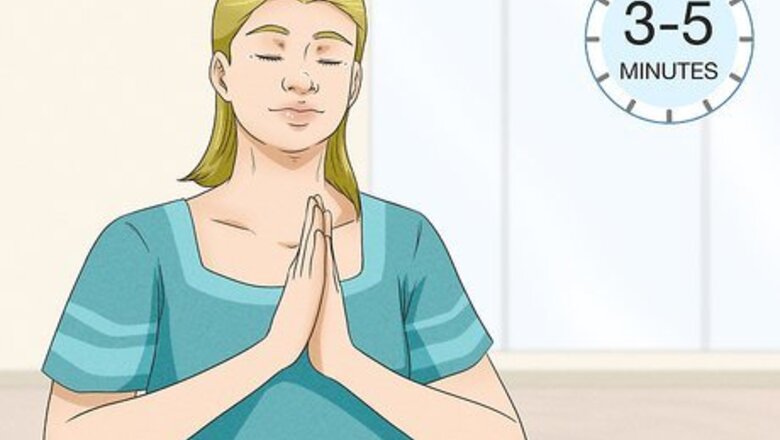
views
Meditate for 3-5 minutes when starting.
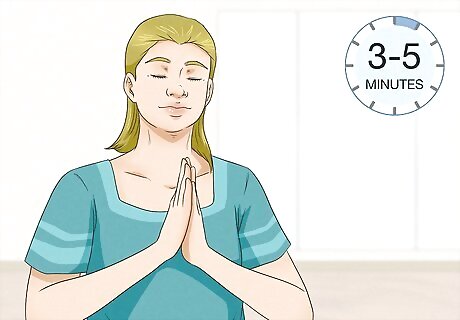
Start small to master the techniques for your self-discovery practice. You can even start meditating for less than 3 minutes if that feels too long. As you get better at meditating, you can increase the amount of time to look inward for longer. Self-discovery is all about looking inward and getting in touch with the real you, free from outside distractions and influences. Meditation facilitates this. Meditating for self-discovery can help you overcome fears and anxieties and help you find a sense of purpose or direction.
Find a quiet place.

In order to meditate, it’s important to be free of any distractions. Find a quiet room or somewhere go peaceful outside. Make sure there is nothing around that might break your concentration. Turn off all electronic devices or leave them in another room. Try to avoid places with lots of people or that have heavy foot traffic. If there is outside noise that you find distracting, consider playing some soft ambient music.
Get comfortable.

Being comfortable helps you focus on your meditation session. Wear loose-fitting clothes that breathe easily and sit on a chair or cushion in a way that is comfortable for you. Although practitioners of meditation are often depicted sitting cross-legged, this is not an essential pose. Be sure to keep your back straight to help facilitate your breathing. If you intend to make meditation a regular practice, you may want to consider purchasing a meditation pillow. Avoid lying down, which might cause you to fall asleep. With meditation, you want to be relaxed yet alert. EXPERT TIP James Brown James Brown Meditation Coach James Brown is a San Francisco Bay Area-based teacher of Vedic Meditation, an easy and accessible form of meditation with ancient roots. James completed a rigorous 2-year study program with Vedic masters, including a 4-month immersion in the Himalayas. James has taught thousands of people, individually, and in companies such as Slack, Salesforce, and VMWare. James Brown James Brown Meditation Coach Being comfortable will improve your meditation. According to James Brown, a meditation teacher: "I recommend sitting comfortably with back support. That can be sitting in a chair, or on the floor leaning against the couch, or even in bed. If you're paying attention to your posture, it's hard to get down into the deeper layers of your consciousness. It's similar to the way that it's hard to focus on the present if you're constantly worried about what's going to happen in the future."
State your goals.
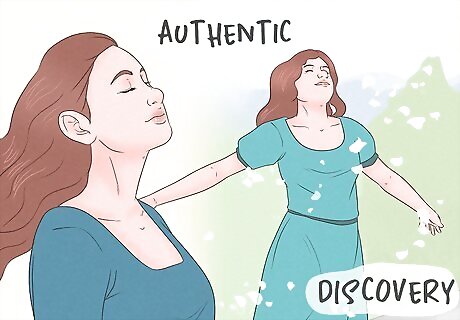
Once you are ready to begin, state to yourself what you want out of your practice. If you are looking for self-discovery, say things like “I want to know myself better” or “I want to find my strengths.” Stating your goals gives your practice purpose and helps you focus better. You can try making your goal a 1-word mantra. For example, if you are trying to better understand yourself, try mantras like “truth,” “discovery” or “authentic.”
Close your eyes.

Meditating with your eyes closed helps you look inside yourself. Once your eyes are closed, make a mental note of how your body feels. Concentrate on and investigate any sensations that come along.
Emphasize your breathing.
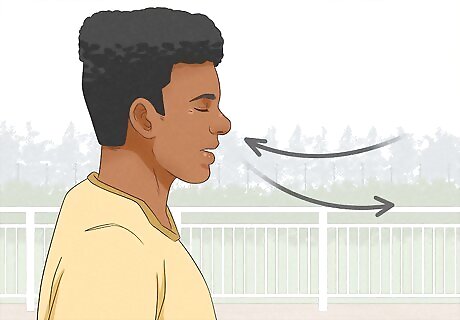
Take deep breaths in and out. Fill your lungs with air and slowly release it. Concentrate on your breathing and the movement of your body as you breathe in and out. Try to breathe from your diaphragm. This helps you take in more oxygen and slow your breathing, helping you relax.
Refocus your attention if it wanders.

It’s normal for your mind to wander when you’re meditating. If this happens, focus your attention again on your breathing, your intention or your mantra, and on how your body feels. That way, you’re ready to keep looking inwards to get closer to your true self, rather than focusing on distracting thoughts. For example, maybe you find yourself thinking about what you’re going to make for dinner later on. That kind of thought isn’t important for self discovery, so let it go and refocus your attention on your meditation practice.
Think about terms you use to define yourself.

Try to discover how you think of yourself. These might be terms based on the roles you play in relationships or jobs. You might say “I am a wife” or “I am a mother” or “I am a manager.” Or, maybe they are terms like “strong man,” “caring friend,” or “creative person.” Once you realize what terms you use to define yourself, you can start to understand how you really feel about yourself. If you’re interested in self-discovery because you’re searching for a path in life, these terms may help guide you. For instance, if you define yourself as a creative person, maybe it’s time to look for a new passion to put some of that creative energy into.
Try to feel your inner pilot light.

Your inner pilot light is your true self and your eternal flame of being. Think about this as an internal flame that governs everything inside you, from your organs to your mind. Try to picture your inner pilot light and imagine how it feels. If you’re going through a dark time in your life, it’s normal to feel like your pilot light is burning dimly. Just know that it never fully burns out!
Don’t run from painful thoughts or feelings.
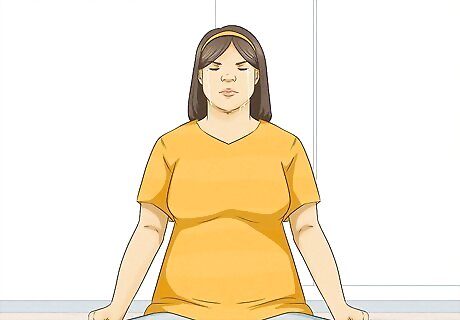
Confronting painful experiences helps you relate to them in different ways. As painful thoughts enter your mind while you meditate, acknowledge them and confront them. Try to understand why you feel the way you do to relate better to yourself. For example, if you feel bad about something that happened at work, acknowledge that and try to determine the “why” behind it.
Consider your natural abilities.

Meditating can help you feel more confident in your abilities. Think about your strengths and abilities to affirm them. Tell yourself that you are truly good at these things and capable of doing them. For example, maybe you’re really good at being a friend, a parent, a co-worker, or an athlete.
Ask yourself personal questions.

This is a good way to practice introspection while meditating. Look inward at your experiences and emotions and ask yourself questions about your past, present, and future to help you understand them. This helps increase your self-awareness and self-knowledge. For example, ask yourself things like: “What am I really feeling right now?” and “What is making me feel like this?” Or, ask yourself, “Where do I really see myself in 5 years?” or “Is the path I’m on right now really going where I want it to?”
















Comments
0 comment